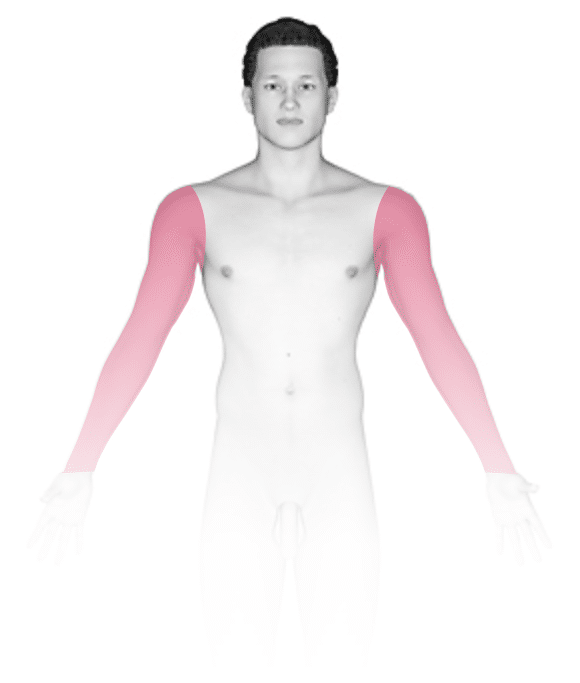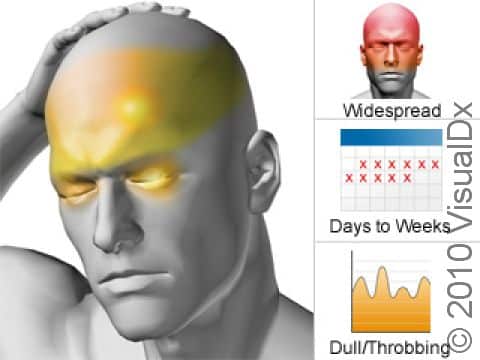Chronic Migraine
A migraine is a set of symptoms that usually includes headache as the main complaint. Migraine headaches are usually severe, affecting one side of the head. Most people with a migraine have vision changes such as sensitivity to light, sensitivity to sound, and nausea. In about 1 in 5 people, migraines involve a warning, called aura. A small number of people get aura without headache.
Chronic migraine is defined as headaches 15 or more days per month, with at least 8 of those days having migraine symptoms, for more than 3 months. There may be a long history of taking medications to relieve headaches. It is more common, though, that chronic migraine has been caused by migraine that has progressed, where the migraine has not been treated effectively.
Who's At Risk?
People with chronic migraine usually have a history of migraines with traditional symptoms, including nausea, vomiting, sensitivity to light and sound, and headache that gets worse with activity.
Chronic migraine is more common in women who have had migraine without aura.
Causes of chronic migraine include either too little treatment of migraine or overtreatment of migraine, particularly too much ibuprofen or medication that contains caffeine. Other risk factors include obesity, stress, and a history of snoring.
Signs & Symptoms
People with migraine that develops into chronic migraine often notice a change in symptoms over months to years. Typical migraine symptoms (dark spots in the vision, shimmering distortion at the edges of vision, dizziness, problems concentrating, trouble finding words, weakness, numbness, or tingling) become less intense, but the headaches become more frequent. The headaches occur daily or almost daily and resemble tension-type headaches, which involve moderately intense pain on both sides of the head that does not throb and is not made worse by physical activity. Additionally, full migraines occur in addition to the milder but almost-daily headaches.
Although a migraine headache is usually moderate to severe, some people are most bothered by the other associated symptoms, such as aura, light sensitivity, or nausea.
Self-Care Guidelines
See the Common and Classical Migraine topic for self-care guidelines to help with traditional migraine symptoms.
For chronic migraine, it is helpful to avoid over-the-counter medications and caffeine. Joining a discussion group, either in person or online, can give you some ideas and support for managing the pain.
The following may also help:
- Improving your sleep habits
- Exercising regularly
- Yoga or stretching
- Massage therapy
- Relaxation techniques
Treatments
Having patience and working closely with your medical professional is important. Your headaches may get worse with treatment and lifestyle changes before they get better.
It often takes time (sometimes years) to break the cycle of chronic migraine. Because your habits and lifestyle can maintain chronic migraine, you and your medical professional should work to improve underlying factors such as:
- Anxiety and depression.
- Frustration.
- Physical and emotional dependencies.
- Physical / lifestyle issues such as obesity, snoring, poor diet, and poor sleep habits.
- Chronic medication overuse or misuse.
Your medical professional may recommend:
- Relaxation therapies, hypnosis, or biofeedback.
- Referral to a sleep expert.
- Cognitive behavioral therapy, which is talk therapy with a trained counselor to help identify stressors and develop coping strategies to minimize symptoms.
- Counseling and treatment for depression and/or anxiety.
Your medical professional may prescribe migraine-preventive medications such as triptans, blood pressure medicines, anticonvulsants, antidepressants, botulinum toxin (Botox), calcium channel blockers, or selective serotonin uptake inhibitors. Consulting with your medical professional is necessary to determine which strategy is best for you.
Visit Urgency
Contact your medical professional if you notice that your headaches are more frequent and your migraines are continuing.
Call your medical professional urgently for any headache if:
- You develop new symptoms not typical of prior headaches.
- You pass out.
- Your headache lasts an unusually long time.
- Your headache wakes you from sleep.
- You experience increased intensity and/or frequency of headaches.
- You have a sudden onset of a severe headache.
Seek immediate medical attention if you or someone you are caring for experience:
- A stiff neck and a high fever with headache.
- Loss of motor function (eg, your muscles don’t move normally), the ability to think clearly, or convulsions with a headache.
- A head injury.
Last modified on May 12th, 2025 at 11:23 am

Not sure what to look for?
Try our new Rash and Skin Condition Finder
